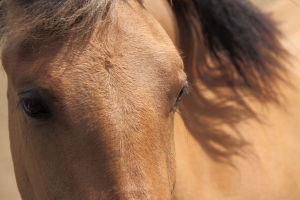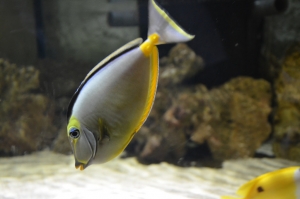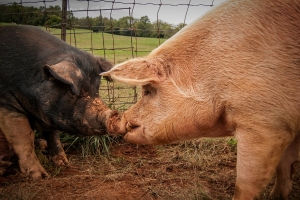Displaying items by tag: Cognition
Why Can Dogs and Horses Read Our Faces?
For anyone who has spent much time around either dogs or horses, two species with a long history of companionship with humans, the news of recent weeks probably comes as no surprise.
Fish Friendships Facilitate Foraging Opportunities
For the first time, scientists have observed a species of fish that literally “watches each others’ backs” while foraging. Coral reef rabbitfishes foraging in pairs were found to forage in a unique manner: one fish forages head down in the coral reef, while the fish’s partner stands watch, head up, scanning the surroundings for threats.
This Little Piggy: A Few Things Animal Advocates Should Know About Pigs
Chimpanzees. Elephants. Dolphins. Perhaps dogs. These are the animals that many people, including animal advocates, envision when thinking of the “smartest” animals. However, this list, accurate as it may be, is by no means inclusive. There are in fact other animals who can hold their own in scientists’ tests for intelligence and emotion, but who are all too often overlooked simply because of the role they play in human society.
Three Times Animal Sentience Made the News This May
At World Animal Net, we define sentience in our forthcoming Model Animal Welfare Act as the capacity to perceive or feel things--more specifically, sentient beings share with us consciousness, feelings, emotions, perceptions – and the ability to experience pain, suffering, fear, distress and states of well-being. Animal sentience is a major underpinning for nearly all the philosophies that explain why animals and their interests deserve consideration and flies in the face of traditional Western views of animals as “automatons” who feel no pain and do not suffer, and consequently are “things” that humans can do with as they like. While animal advocates have long been criticized for their views as being based in passion and not rationality, science is now confirming what advocates have always known.
What Do Elephants, Rats, and Ravens Have in Common? Empathy.
We are all familiar with the feeling of empathy. We feel sad when our friends and family are sad, and we share their happiness when they are happy. But is empathy a trait unique to humans?
Smoke and Mirrors: Three Things You Should Know About the Mirror Self-Recognition Test
As a species, humans like to draw lines and we like concrete categories that help us navigate the world around us. We see animals no differently. We like to draw categories which help us determine what our responsibility to the animal in question is, and often the less these categories impinge on preexisting uses and perceptions, the more likely they are to be accepted.






